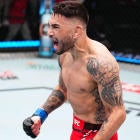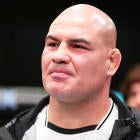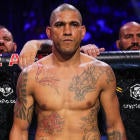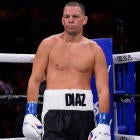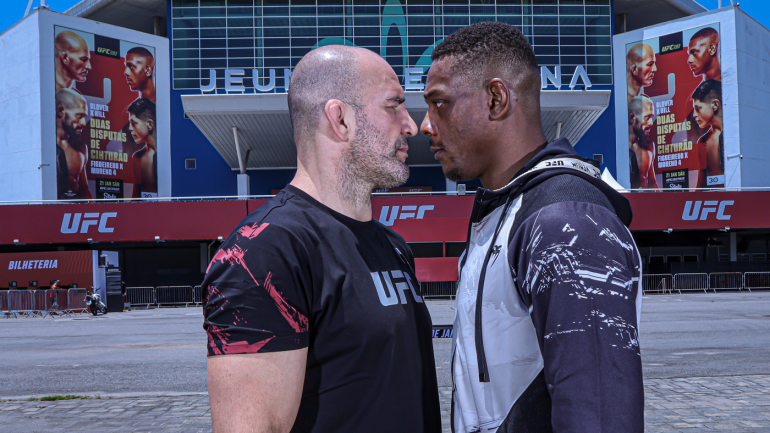
To describe the recent news cycle within mixed martial arts over the past month as anything from surprising to disturbing would be an understatement.
Among the varying degrees of shocking headlines, however, was the development within the heavyweight division as longtime 205-pound king Jon Jones became a de facto savior of sorts for the UFC by ending his three-year layoff and announcing a March 4 title bout against Cyril Gane just as defending champion Francis Ngannou chose to exit the promotion as a free agent.
Although fight fans will likely miss out on the prospects of an Ngannou-Jones superfight as part of the fallout, the UFC promotional machine can benefit from the return of Jones' enigmatic star power just when it needed it most (provided Jones can keep his often tumultuous personal life in check). But what about the division Jones left behind after vacating his title in 2020 and announcing his intentions of rebuilding his body and moving up?
To put it bluntly, the UFC light heavyweight title picture is an absolute mess at the moment heading into Saturday's UFC 283 pay-per-view event in Rio de Janeiro, marking the end of the promotion's own three-year gap, fueled by the coronavirus pandemic, in bringing live fights to Brazil.
For as barren and unstable as the post-Jones era has been at 205 pounds, it hasn't been without a few memorable moments, including late career title surges from Jan Blachowicz and Glover Teixeira, both of which were as inspiring as they were unlikely, and an all-time great championship war between Teixeira and Jiri Prochazka that produced 2022's fight of the year.
But for anyone looking for stability following such a memorable reign from Jones -- which included him being stripped of the title on three occasions amid a historic rivalry with Daniel Cormier -- there has been no such thing.
Can't get enough boxing and MMA? Get the latest in the world of combat sports from two of the best in the business. Subscribe to Morning Kombat with Luke Thomas and Brian Campbell for the best analysis and in-depth news.
The UFC's best-laid plans involved Teixeira and Prochazka having a rematch of their violent duel on Dec. 10, which fell apart when Prochazka badly injured his shoulder and was forced to vacate his title ahead of what is expected to be a one-year recovery. Teixeira was still willing to fight at UFC 282 to save the event but declared he would only fight Blachowicz on short notice and not top contender Magomed Anakalaev unless Teixeira was given an additional month to prepare.
Instead, UFC chose to take the previously scheduled Blachowicz-Ankalaev fight at UFC 282 and elevate it to a title bout. The problem was that neither fighter got out of first gear against one another, allowing the belt to remain vacant following a disappointing draw.
Still needing a title bout to headline its return to Brazil this weekend, UFC made the difficult decision to simply match Teixeira (33-8), the 43-year-old ageless wonder who will fight in front of his home fans for the first time since 2014, against the next contender in line, which turned out to be red-hot slugger Jamahal Hill (11-1, 1 NC), who is riding a three-fight knockout win streak.
This isn't an indictment on the merits of Teixeira-Hill being a potentially exciting fight, nor is it a series of complaints aimed at the title parity that has become the norm in the aftermath of Jones' exit, following a run that lauded him status as potentially the greatest fighter in the sport's history.
In fact, parity has played a huge part in light heavyweight becoming the true glamor division for UFC during a pair of consecutive eras that were largely responsible for the promotion achieving the type of success that has allowed UFC to cross over to the mainstream level while achieving the kind of financial success no one outside of Dana White and his initial partners, Lorenzo and Frank Fertitta, could've ever imagined.
The 205-pound title rivalries between Tito Ortiz, Randy Couture, Ken Shamrock and Chuck Liddell created the promotion's first mainstream stars thanks to the heated battles between them from 2002 to 2006. That era gave way to an even crazier one from 2007 to 2011, in which the title was passed around like a hot potato between future Hall of Famers like Quinton "Rampage" Jackson, Forrest Griffin, Rashad Evans, Lyoto Machida and Mauricio "Shogun" Rua.
Even the one fight that somewhat bridged the gap between the two eras, the 2005 season 1 finale of "The Ultimate Fighter" pairing Griffin against the late Stephan Bonnar, an all-out war on cable television credited with rescuing the brand from inevitable bankruptcy, was contested at 205 pounds.
The combination of world class fighters with huge personalities producing one memorable title fight after another for nearly a full decade until Jones assumed dominance in 2011 (by destroying many of the former champions listed above) was enough to declare the division as the sexiest and most exciting in the sport's history. It's a point only corroborated by the fact that some of the greatest moments in Pride history, the last MMA promotion that truly competed with UFC on a head-to-head level (although Strikeforce came close), came in their middleweight division during the same era, which is equivalent from a weight standpoint to light heavyweight in the UFC.
The post-Jones era has seen parity without the same level of star power along with it. Even worse, the UFC's handling of who fights for the championship and when, including how it handled the fallout of Blachowicz-Ankalaev, has conspired to water down the integrity of the actual title.
This is during a time in the 205-pound landscape globally where rival promotions like Bellator MMA, which recently concluded a $1 million Grand Prix tournament won by Vadim Nemkov, have openly claimed they already have the division's best fighter in the world. But the potential problems go even deeper than that.
The worst thing a promotion can have, from an optics standpoint, is a divisional champion whom fans don't recognize as the best in the division. Sometimes, that's an inevitable position based upon matchups and upsets, and few are blaming the UFC for injuries it can't prevent. But the hasty decision to prioritize promoting a title fight of some kind, at all costs, leaves even more potential for Saturday's fallout to become wonky.
As fine of a fight as Teixeira-Hill is, there's not much of an argument to be made that it should even be headlining UFC 283, not with a historic flyweight title bout in the co-main event as Deveison Figueiredo and Brandon Moreno meet for the fourth time in their all-action rivalry. But for as unsatisfying as the Blachowicz-Ankalaev result was, there are two potential scenarios this weekend that could produce similar feelings.
What if Teixeira regains the title in front of his adoring fans in yet another war and decides to go back on his word and immediately retire with the title? Or what if Hill wins but does so in a manner that is anything but convincing?
Or what if the two fight to yet another unthinkable draw? Would Blachowicz and Ankalaev simply fight again for the title or might the UFC look even deeper down the rankings to try and reward the next two fighters in line?
For sure, this is no longer your father's light heavyweight division (even if your father is the same age as Teixeira), even though it might be difficult to cry poor for a division that has largely known nothing but excitement and legitimacy throughout its history.
The best thing that can happen for UFC is that the best light heavyweight in the division shows up on Saturday and wraps the gold around his waist inside Jeunesse Arena following yet another memorable duel, even if some still believe the new champion will simply be a transitional one until Ankalev is ready to claim it.
It's just hard not to question who that best fighter actually is and whether or not he will be in attendance at UFC 283.
Who wins UFC 283: Teixeira vs. Hill? And how exactly does each fight end? Visit SportsLine now to get detailed picks on every fight at UFC 283, all from the incomparable expert who's up nearly $12,000 on MMA in the past four years, and find out.

















